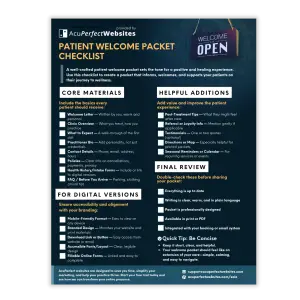AI tools like ChatGPT make it easy to churn out website content quickly: blogs, service pages, FAQs, and more. But if you’re leaning too heavily on AI to populate your acupuncture website, it could put your site at risk of a manual review by Google. That’s not just a technical problem, it could mean a drop in visibility, a loss of patient trust, and long-term damage to your online reputation.
Let’s unpack what a manual review is, what triggers it, and why content quality matters more than ever.
What Is a Manual Review by Google?
 A manual review happens when a real person at Google evaluates your website for quality, trustworthiness, or possible violations of their guidelines. Unlike algorithmic updates (which are automated), manual reviews are triggered when something looks suspicious often due to low-quality content, spammy patterns, or black-hat SEO tactics.
A manual review happens when a real person at Google evaluates your website for quality, trustworthiness, or possible violations of their guidelines. Unlike algorithmic updates (which are automated), manual reviews are triggered when something looks suspicious often due to low-quality content, spammy patterns, or black-hat SEO tactics.
If Google finds that your content violates its guidelines, you may receive a warning in Google Search Console or, worse, see your rankings drop without explanation. In some cases, pages may be deindexed entirely.
For small practices that depend on Google visibility to attract new patients, this isn’t a risk worth taking.
Why Google Is Watching AI Content More Closely
 Google has made its position on AI-generated content clear: it’s not against AI it’s against low-quality content. If the information is helpful, accurate, and created to serve the reader (not just search engines), it can rank well.
Google has made its position on AI-generated content clear: it’s not against AI it’s against low-quality content. If the information is helpful, accurate, and created to serve the reader (not just search engines), it can rank well.
But Google’s trust hinges on something bigger:
E-E-A-T = Experience, Expertise, Authoritativeness, and Trustworthiness.
When content is generic, lacks depth, or reads like it was mass-produced, it tends to violate the spirit of these guidelines. That’s why Google is refining its algorithms and using human reviewers to spot AI content that mimics helpful writing but doesn’t provide real value.
Patterns That Can Trigger a Review
 There’s no flashing red alert that tells Google a website is using AI. Instead, it looks for patterns, many of which show up when AI is overused or poorly managed.
There’s no flashing red alert that tells Google a website is using AI. Instead, it looks for patterns, many of which show up when AI is overused or poorly managed.
Common triggers include:
- Dozens of blog posts published in a short span, all with similar formatting or phrasing
- Service pages that sound identical with only minor word swaps
- No author information or bio attached to the content
- Repetitive intros like “Acupuncture is an ancient Chinese practice…” without any local or clinical relevance
- Pages with minimal content, little internal linking, and no visual support (photos, charts, patient guides, etc.)
These aren’t just red flags for Google. They’re turnoffs for patients, too.
How Overusing AI Can Weaken Your Site's Credibility
 Even if Google doesn’t catch on right away, your visitors will. Patients looking for acupuncture in their area don’t want vague, robotic language. They’re looking for someone who understands their pain, speaks their language, and lives in their community.
Even if Google doesn’t catch on right away, your visitors will. Patients looking for acupuncture in their area don’t want vague, robotic language. They’re looking for someone who understands their pain, speaks their language, and lives in their community.
Low-quality content increases bounce rates, reduces average time on site, and makes it less likely other websites will link to yours. All of those are indirect SEO signals that tell Google, “This page isn’t very helpful.”
Over time, your visibility shrinks not because of a technical penalty, but because your site just isn’t connecting.
The E-E-A-T Factor and Acupuncture Content
 For acupuncturists, E-E-A-T matters even more than it might for an e-commerce store or entertainment blog. You’re in healthcare, patients need to trust you before they’ll book.
For acupuncturists, E-E-A-T matters even more than it might for an e-commerce store or entertainment blog. You’re in healthcare, patients need to trust you before they’ll book.
That trust starts with:
- Showing experience with real patient conditions and treatments
- Writing from the perspective of a licensed professional, not a content mill
- Mentioning your local city, clinic, or community ties
- Including credentials or a brief “About the Author” section on blog posts
- Answering common patient questions in your voice, not AI’s
When that’s missing, your website loses the human element and that’s what makes patients click away.
What a Manual Review Might Look Like (and How to Recover)
 If Google initiates a manual review, you might see a message in your Google Search Console, though not always. More often, the signal is subtle: a sudden drop in keyword rankings, reduced impressions, or pages that used to rank no longer appearing in search results.
If Google initiates a manual review, you might see a message in your Google Search Console, though not always. More often, the signal is subtle: a sudden drop in keyword rankings, reduced impressions, or pages that used to rank no longer appearing in search results.
To fix this, you’ll need to:
- Identify and remove or rewrite low-quality or AI-heavy content
- Add author names, bios, and credentials to blog posts
- Add more local, practical, and personal information
- Focus on quality over quantity, even one solid blog post per month is better than 20 AI drafts
Recovery isn’t immediate, but it’s possible especially if you start showing Google and your patients that your site is run by a real practitioner.
Smart Ways to Use AI Without Triggering a Review
 This isn’t a call to abandon AI entirely. It can still be a useful tool, but it needs to be used with intention.
This isn’t a call to abandon AI entirely. It can still be a useful tool, but it needs to be used with intention.
Here’s how to do it right:
- Use AI to brainstorm blog topics or create outlines, not publish-ready content
- Treat AI content as a starting point then add your own stories, opinions, and clinical insights
- Don’t publish dozens of articles in one go. Spread content out over time.
- Make every page locally relevant. Mention your city, nearby landmarks, seasonal health trends, and how you support your community
- Check tone and language. It should sound like you, not a generic Wikipedia entry
AI can help you work faster, but it can’t replace your voice. That’s what patients and search engines want to hear.
Why It’s Worth Investing in Human Content
 The best-performing acupuncture websites don’t rely on shortcuts. They focus on real, useful, engaging content that reflects the practitioner’s knowledge and values. That takes time and that’s a good thing.
The best-performing acupuncture websites don’t rely on shortcuts. They focus on real, useful, engaging content that reflects the practitioner’s knowledge and values. That takes time and that’s a good thing.
AI-generated content often lacks nuance. It can’t share what it’s like to treat someone for frozen shoulder, or how patients respond to cupping therapy during allergy season. It can’t describe the moment someone finally sleeps through the night after weeks of insomnia.
That kind of storytelling, paired with clear service pages and helpful blogs, builds trust. It turns visitors into patients.
And it keeps your site safely out of Google’s penalty radar.
Final Thoughts: Stay Visible by Staying Real
 Overusing AI-generated content may save time, but it puts your acupuncture website at risk. Google’s manual reviews are designed to flag websites that rely too heavily on thin, repetitive, or low-quality content. Even if you avoid a penalty, generic AI writing can erode patient trust, reduce engagement, and weaken your authority online.
Overusing AI-generated content may save time, but it puts your acupuncture website at risk. Google’s manual reviews are designed to flag websites that rely too heavily on thin, repetitive, or low-quality content. Even if you avoid a penalty, generic AI writing can erode patient trust, reduce engagement, and weaken your authority online.
The safest and most effective path forward is balance: use AI as a brainstorming tool, but always add your own voice, clinical experience, and local expertise. That’s what makes content resonate with both patients and search engines.
When you rely too much on AI, you don’t just risk a manual review from Google. You risk becoming invisible to the very people you’re trying to reach.
Download Our Free Patient Welcome Packet Checklist
 Your first impression can make all the difference in whether a new patient returns. This free Patient Welcome Packet Checklist helps you create or improve your welcome materials so they build trust, set clear expectations, and encourage long-term care. Download it now to make sure your packet supports retention—without missing any important details.
Your first impression can make all the difference in whether a new patient returns. This free Patient Welcome Packet Checklist helps you create or improve your welcome materials so they build trust, set clear expectations, and encourage long-term care. Download it now to make sure your packet supports retention—without missing any important details.
Contact us today if you’re ready to take your website to the next level. At AcuPerfect Websites we can help you establish an online presence that amplifies your new patient efforts.
Get Professional Support
Let us help you grow your practice and become the go-to acupuncturist in your community. Our mission is to help new patients find your practice.
Next Step and Taking Action
 If you want to avoid the risks of AI-heavy content while still keeping your website fresh, AcuPerfect Websites can help. Every plan includes custom design, SEO setup, and compliance-friendly tools. Our Premium and Premium+ plans even provide TCM-rich blog posts written for real patients, not robots.
If you want to avoid the risks of AI-heavy content while still keeping your website fresh, AcuPerfect Websites can help. Every plan includes custom design, SEO setup, and compliance-friendly tools. Our Premium and Premium+ plans even provide TCM-rich blog posts written for real patients, not robots.
That means you’ll stay visible in search, build patient trust, and never have to worry about Google flagging your content.
Our websites are built specifically for acupuncturists, with professional, human-written blog posts, SEO optimization, and compliance-friendly tools already included. From condition-specific landing pages to Google Analytics and Search Console setup, we take care of the details so you can focus on treating patients.
Get Professional Support
AcuPerfect Websites has been building acupuncture websites since 2011, and we know exactly what works. Our sites are designed with SEO best practices, easy navigation, and conversion-focused layouts—ensuring that your practice ranks well and attracts new patients.
We can help you grow your practice and become the go-to acupuncturist in your community.
Give your practice the refresh it deserves! Let’s get started!

Need a high quality website for your practice?
AcuPerfect Websites offers website plans for all budgets. Our websites rank well in search results and our features can help save you time and money, accelerate your patient attraction and enable you to manage your practice easier.
We’d be grateful to join you on your practice journey by helping you attract new patients to your practice, so you can do what you love, treat more patients.


